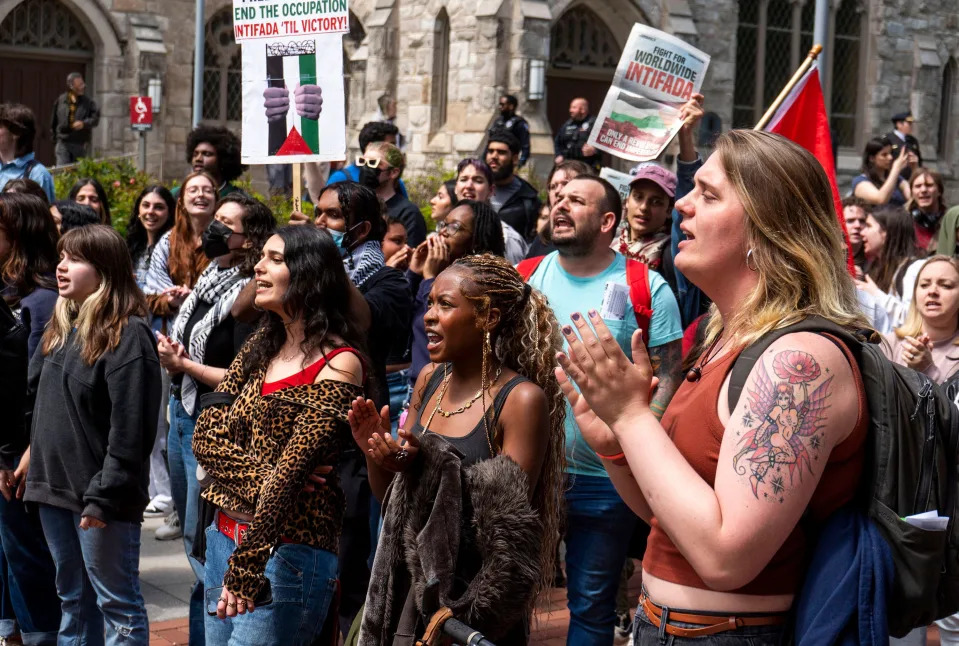Will Daniel
Mon, Jun 10, 2024
China has a “near monopoly” on the mining of many raw materials that are critical for the production of semiconductors and other technologies, JPMorgan said Monday, highlighting the importance of key minerals in the escalating U.S.-China trade war.
President Biden upped the ante in the ongoing spat with China last month when he targeted Chinese products including solar cells, EVs, batteries, steel, aluminum, medical equipment, and more with a raft of new tariffs.
“The Biden administration’s latest tariff announcement on $18 billion of Chinese imports has elevated the debate on whether China’s dominance in the critical minerals supply chain will emerge as the latest battleground for U.S.-China strategic competition,” wrote JPMorgan’s executive director of strategic research, Amy Ho, and global head of research, Joyce Chang, in a note to clients.
In 2022, China produced 68% of the world’s rare earth minerals, which are used for things like magnets and batteries, and 70% of its graphite, which is used in lubricants, electric motors, and even nuclear reactors.
However, China’s real dominance lies in its mineral processing capabilities, according to JPMorgan. China processed 100% of the world’s graphite supply in 2022, 90% of rare earths, and 74% of cobalt (another critical mineral for batteries).
“Increasing dependence on critical minerals, which are key inputs to semiconductors, EVs, military weapons etc., has raised concerns that China could use its dominance in this supply chain to retaliate against U.S. industrial policy,” Ho and Chang warned.
The U.S. and China’s tit-for-tat trade war began in 2018, when then-President Donald Trump slapped tariffs on a range of Chinese goods and commodities, including solar panels and steel, citing the country’s intellectual property (IP) theft and unfair trade practices. Since then, tensions between the world’s two largest superpowers have only escalated, with a high-stakes battle over semiconductor IP and manufacturing taking center stage amid the AI boom.
Import-only minerals
Of the minerals that the U.S. Geological Survey has identified as critical to the U.S. economy and national security, the U.S. was 100% reliant on imports for 12 of them.
1. Arsenic
Top source: China
Applications: Semiconductors
2. Cesium
Top source: Germany
Applications: Research and development
3. Fluorspar
Top source: Mexico
Applications: Manufacturing of fuel, foams, refrigerants, and more
4. Gallium
Top source: Japan
Applications: Integrated circuits and optical devices
5. Graphite
Top source: China
Applications: Lubricants, batteries, and fuel cells
6. Indium
Top source: South Korea
Applications: Liquid crystal display screens
7. Manganese
Top source: Gabon
Applications: Manufacturing of steel and batteries
8. Niobium
Top source: Brazil
Applications: Manufacturing of superalloys
9. Rubidium
Top source: China
Applications: Electronics research and development
10. Scandium
Top source: Japan
Applications: Manufacturing of alloys, ceramics, and fuel cells
11. Tantalum
Top source: China
Applications: Manufacturing of electronic components, capacitors, and superalloys
12. Yttrium
Top source: China
Applications: Manufacturing of ceramics and lasers
China is the top source for five out of 12 of these critical minerals, and the second or third top source for an additional three: Fluorspar, Galium, and Scandium. But China isn’t the only nation the U.S. relies on for key minerals. Mexico, Japan, and Korea are among the other top sources.
The U.S. relies on imports for 50% or more of its supply of an additional 29 minerals beyond the dozen listed above. This includes a 90% plus net import reliance for titanium, 14 rare earths, and bismuth.
Will China weaponize its ‘near monopoly’ on critical minerals?
With the U.S.-China trade war heating up, minerals could prove an exploitable weak point for Beijing. In a worst-case scenario where China increases export restrictions for key minerals or implements a full ban, the electronics, oil refining, defense, and EV sectors would be especially at risk, JPMorgan’s Ho and Chang noted.
Still, for now, JPMorgan’s strategists don’t foresee a serious mineral turf war taking place. “There are growing concerns that China will weaponize its position, but we expect China’s response to remain proportionate and limited based on past actions,” they wrote Monday, adding that the U.S. can also look to alternative suppliers and substitutes.
The pair offered a few recommendations for how the U.S. can stabilize its supply of critical minerals to protect the defense industry, support the EV transition, and prevent economic fallout from a potential commodity trade war.
First, Ho and Chang noted that creating new U.S. mining capacity isn’t an option to fix the U.S.’s reliance on mineral imports. New mining operations take years to start, come with environmental risks, and regulatory approval in the U.S. is often uncertain. It takes 16.5 years, on average, for a mining project to move from discovery to production in the U.S., according to the International Energy Agency. And securing a permit for a mine alone takes an average of seven to 10 years.
Instead of new mining operations, Ho and Chang recommended the diversification of mineral sourcing, the implementation of new mineral mining technologies, and strategic stockpiling of key minerals. They estimated that technological innovation and recycling could reduce demand by 20% to 40%, while material substitution could alleviate strains on supply and reduce costs over the next few decades. In addition, strategic stockpiling by the US government and corporations could act as a buffer against sudden supply chain disruptions.
“More opportunities exist to diversify critical mineral suppliers than there are for oil, and the countries that are in the process of broadening their mining and process capabilities include allies such as Canada, Australia, the EU, and Japan,” they added. “The U.S. should remain optimistic.”
This story was originally featured on Fortune.com
Norway just loosened China’s stranglehold on rare minerals critical to the global economy—and it’s a huge win for Europe and the U.S.
Fortune· Rodger Bosch—AFP/Getty Images
Norway just struck a gold mine. Well, a rare mineral mine.
The Norwegian mining company, Rare Earths Norway, just uncovered the largest deposit of rare earth elements in Europe. The discovery has major implications not just for the company, which is certainly poised for a windfall, but for global geopolitics.
Rare Earths Norway found the deposit in the Fen Carbonatite Complex located in the southern tip of the country, according to a press release. These rare elements, which are a family of 17 metals, are used in a host of consumer electronics like smartphones and flat-screen TVs. They’re also critical to the green-energy transition because they are key components in products like electric vehicles and wind turbines. But, as the name suggests, they are in short supply around the world. By dint of geography or luck, the vast majority of rare earth elements are found and extracted in China, giving the world’s second largest economy extraordinary influence in determining their supply and demand across the world. Currently, China accounts for 70% of the extraction of these elements from the ground and 90% of their processing, according to research from the Oxford Institute for Energy Studies, an independent energy research institute.
Norway’s discovery would finally make Europe a player in the industry.
“It is important to state that there is absolutely no extraction of rare earth elements in Europe today,” Rare Earths Norway CEO Alf Reistad told CNBC.
Rare Earths Norway’s discovery comes at a time when Europe and the U.S. have had tense trade relations with China. Many of those tensions are wrapped up in national-security issues as well. Europe is wary of China, given its allyship with Russia, which has been largely ostracized on the continent, certainly by members of the European Union. Meanwhile, the U.S. and China are engaged in what one economist called a “forever” trade war. The U.S. has accused China of intentionally oversupplying global markets with certain products, like electric vehicles. The concern is that because China has cornered the market on rare elements it could also manipulate that market by doing the opposite and purposefully withholding supply to drive up prices—something it has threatened to do, but hasn’t yet pulled the trigger on.
Norway has already made some strides in trying to chip away at Europe’s dependence on China to get access to the materials. In January, the Norwegian parliament voted 80–20 to allow offshore, deep-sea mining of rare minerals in remote waters to the north of the country. Norway, which is already a major producer of oil and natural gas, would become the first country to allow its seabed to be mined for rare minerals. Current plans would see Norway mine 108,000 square miles, an area roughly the size of Colorado. The newly discovered deposit only strengthens Europe’s hand against rivals like China.
Though the fact that these reserves were located in China was due to chance, China’s ability to make the most of them and use them as a strategic geopolitical tool—even a cudgel—was intentional. Through years of domestic industrial policy, China secured patents in the technology needed to extract the rare elements, directing huge amounts of government resources toward the project, and investing heavily in extracting ore from deposits across the globe.
Once its dominance was established, the Chinese government sought to protect it. Last year, China banned the export of technology used to extract gallium and germanium, two elements used in chip manufacturing. China’s strong market position was also favored by lax labor standards. “This dominance has been achieved through decades of state investment, export controls, cheap labor, and low environmental standards,” the Oxford Institute researchers wrote.
This story was originally featured on Fortune.com






